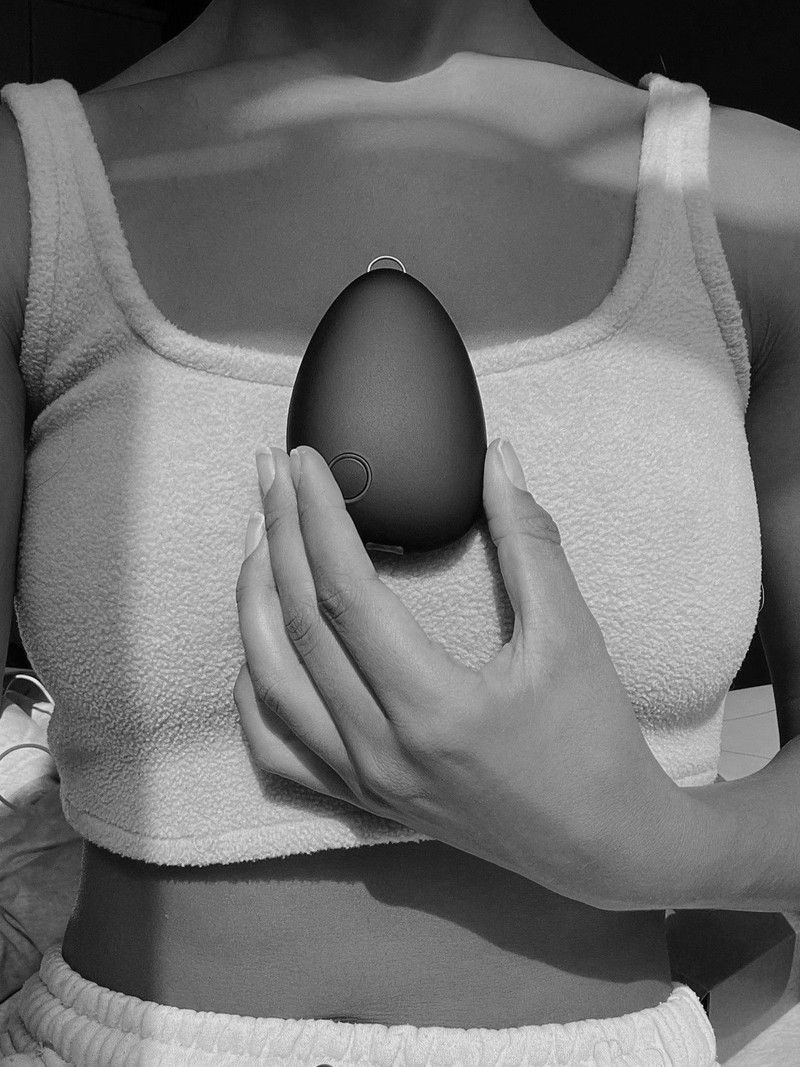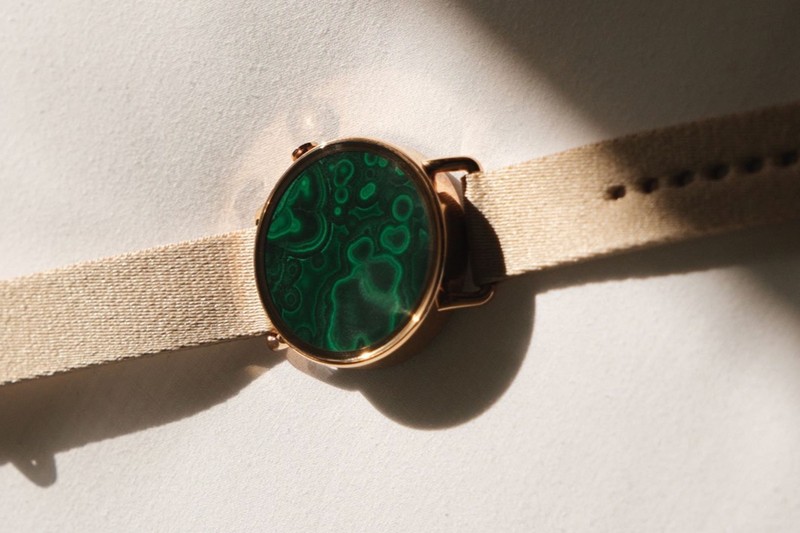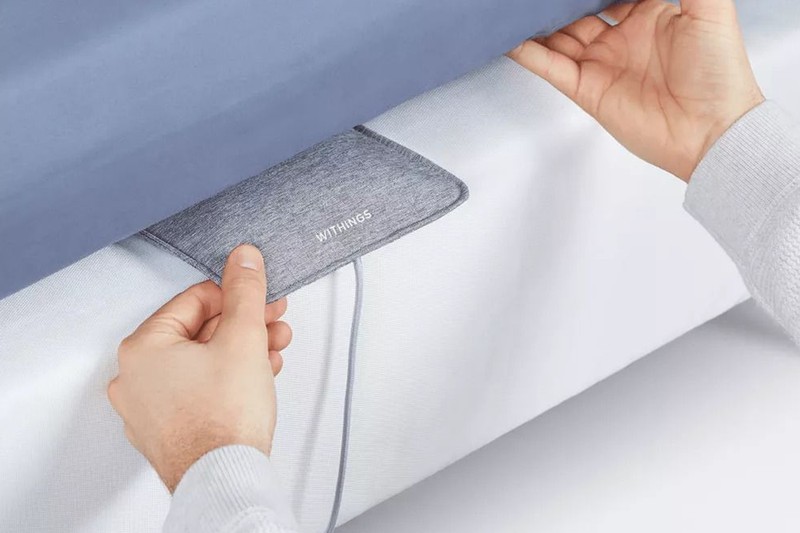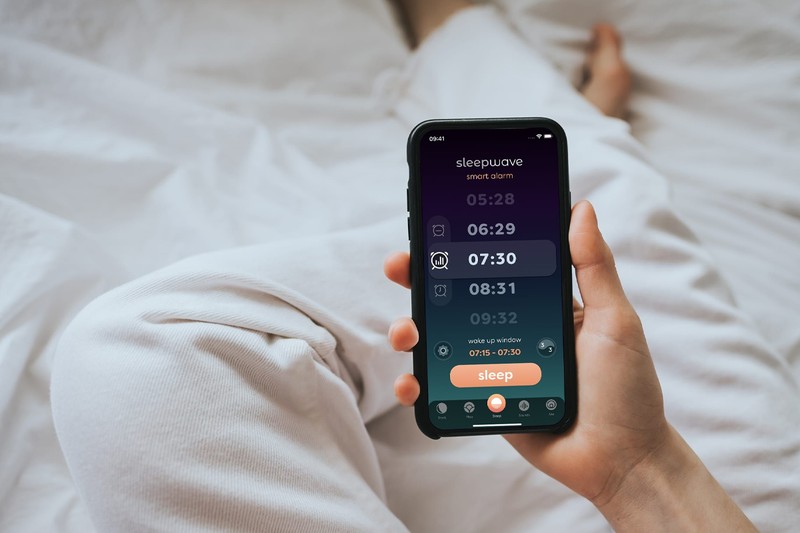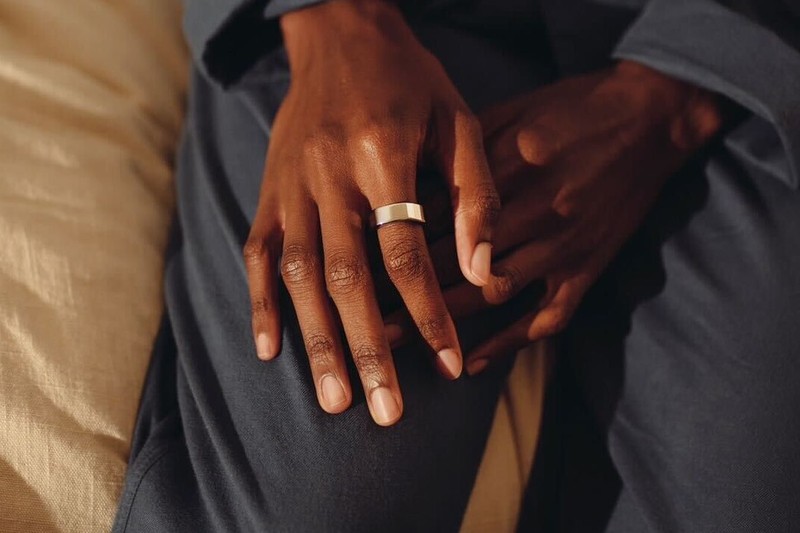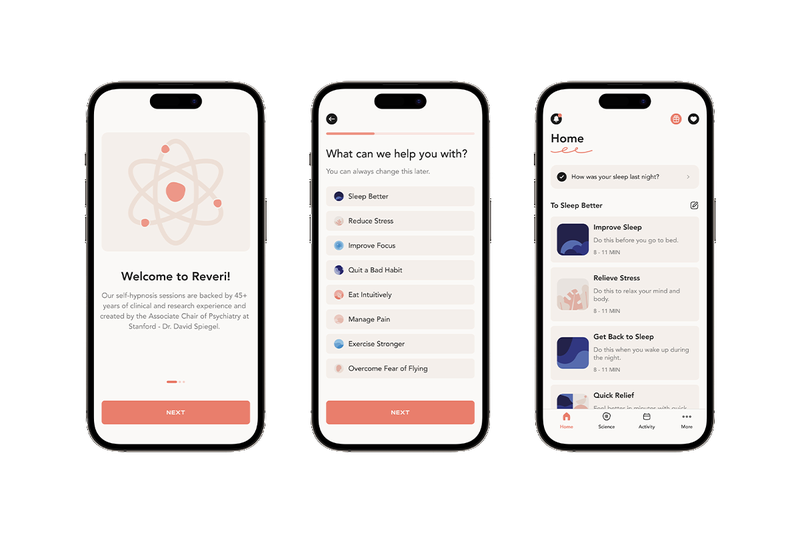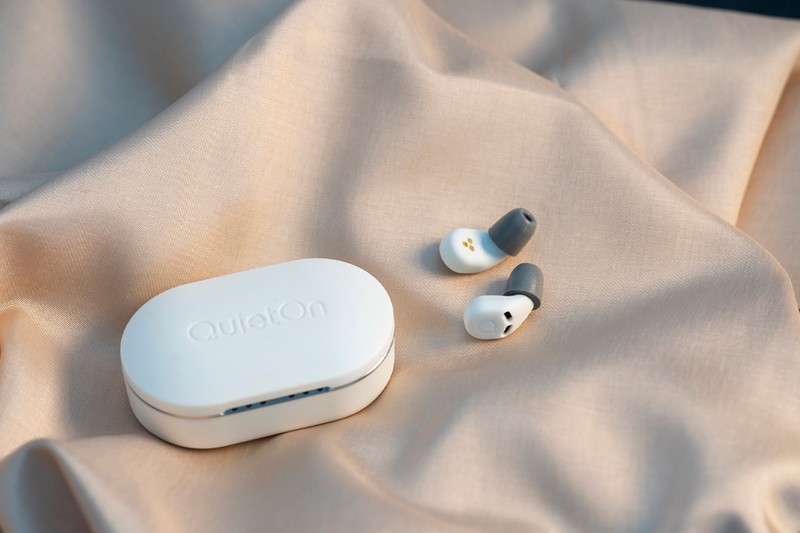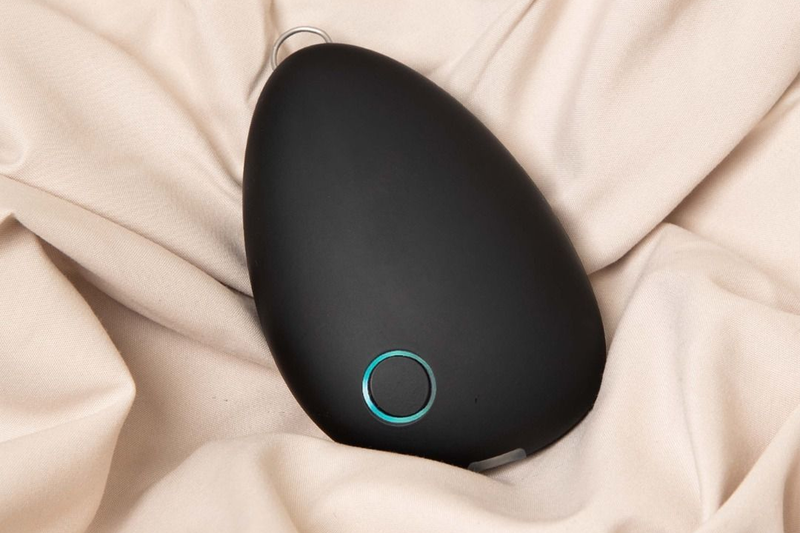The Tech That Could Lead To A Better Night’s Sleep
Nowatch
Feeling too alert to fall asleep and experiencing racing thoughts can stem from poor daytime habits. Nowatch is a first-of-its-kind wearable that tracks your heart rate and monitors changes in sweat gland activity throughout the day to measure stress levels. When the device predicts an overstimulated mind, it’ll send a vibrational signal to encourage you to do a relaxation exercise. The vibrations are designed to be supportive rather than anxiety inducing, so you can recognise when stress is building and manage it better. The end goal? Reduced cortisol levels and a calmer state of mind, both of which will encourage deep, restful sleep. It’ll also track your sleep cycles to encourage rest and recovery, and help you wake up feeling fresh.
What The Experts Say: Kathryn Pinkham, founder of The Insomnia Clinic, is a fan of the 24-7 nature of the Nowatch. “Tech that promotes mindfulness and makes you more aware of stress can help you keep on top of anxiety and make you more aware of your stress levels. This, in turn, could be a useful building block for sleep."
Visit Nowatch.com
Withings
A mat-like device that slips under your mattress, the Withings Sleep Analyser is a world-first piece of kit that records your breathing, pulse and movements during the night. Developed in collaboration with leading French sleep physicians, it provides advanced sleep analysis – come morning, it’ll tell you how long you slept for, how many times your sleep was interrupted, how long it took you to go to sleep and how long you spent in each phase of sleep. It can also detect sleep apnoea, an often-undiagnosed condition that affects one in five adults – if left untreated, it can lead to health complications. Knowledge is power – use your data to nail your sleeping habits and get back on track with your sleep.
What The Experts Say: If you are struggling with chronic fatigue or never wake up feeling refreshed, discovering how to optimise your sleep could be game-changing, but for Kathryn, you shouldn’t obsess over the data. “Tracking sleep can help you identify if there’s an issue with your sleep, although in my experience if you’re struggling to sleep well, then you know this already and you don’t need tech to tell you. To sleep well, we need a good appetite for sleep (a high sleep drive), a body clock which is in the correct pattern and a good association with sleep – none of which can be achieved by a device.”
Visit Withings.com
Sleepwave
The Sleepwave app transforms your phone into a motion-sensing sleep tracker and addresses an area of sleep health that’s often overlooked: the quality of your morning wake-up. Most of us are woken in the morning by harsh, fixed-time alarms that can trigger stress in the brain, resulting in grogginess. With Sleepwave, set a window of anywhere between 15 minutes and one hour, and the smart alarm will wake you with gentle soundscapes when it detects your brain to be naturally waking. If you struggle to unwind in the evening, the app also offers ‘wavescapes’ – visualisations that react and synchronise to your movement without you needing to touch your phone.
What The Experts Say: Those who consistently sleep well have a solid sleep routine, says Dr Alka Patel, GP and lifestyle medicine physician, and any app that promotes a good routine could be worth trying. “If this app can also integrate sleep data, provide mindfulness and offer sounds specifically designed to induce sleep, it could help. Apps that use music or sounds that have alpha wave frequencies – brainwave patterns associated with relaxation and sleep, the kind of state you want to be in before sleep – can also help you unwind.”
Visit Sleepwave.com
Oura Ring
The Oura ring bills itself as a sleep and recovery tracker. Monitoring over 20 body signals, including your sleep, it tells you how ready you are for the day ahead. Working alongside an app, it’ll help inform your lifestyle habits and provide insight into how your current daily practices affect your wellbeing – and sleep. It’s so accurate that it’s been deemed comparable to sleep lab testing based on scientific research. In the long term, it can lead to better performance, mood, energy levels and productivity.
What The Experts Say: “I highly recommend the Oura ring,” says Alka. “It’s accurate and sophisticated, using infrared lights and temperature sensors to provide sleep data that tracks sleep stages, heart rate, body temperature, respiratory rate and movement. Not only does it provide a wide range of data, but it has the bonus of being a ring rather than a watch – most people find rings less intrusive to wear during sleep.” However, Kathryn recommends not obsessing over the data. “Tech such as the Oura ring can show you how alcohol or exercise affect sleep, enabling you to make long-term lifestyle changes. However, if you suffer with insomnia, you may find the data anxiety-inducing.”
Visit OuraRing.com
Reveri
A clinically backed self-hypnosis app created by a world-renowned psychiatrist, Reveri can help you relieve stress, improve sleep and build better habits in just ten minutes. Safe and easy to use, the app offers audio exercises designed to tap into the powers of your mind, focusing on sleeping better and letting your body fall peacefully into sleep. If you struggle with insomnia, you may find the longer you stay awake, the longer you stress about how little sleep you’re getting – a thought that can keep you awake. Studies suggest hypnosis is a powerful way to treat insomnia by reframing these thoughts and other sleep habits.
What The Experts Say: “Taking the time to process your thoughts and worries during the day means they’re less likely to disrupt you at bedtime,” says Kathryn. “Getting things out of your head gives you a fresh perspective and is a therapeutic way to deal with thoughts and habits.” Before you use an app for sleep, always make sure it offers clinically proven therapy, the experts add, and ensure it promises long-term results, not just a quick fix. Reveri ticks these boxes.
Visit Reveri.com
QuietOn
Whether you live in a city, work a night shift and need to sleep during the day, or have a partner who snores, the right pair of earplugs can give you the rest you crave. The world’s smallest active noise-cancelling earplugs, QuietOn’s earbuds block low-frequency sound, creating a much quieter and more peaceful environment for sleep. The small size makes them comfortable for sleeping – including side sleepers – and the long battery life means you can go a week without having to recharge them. Now in their third generation, the QuietOn buds are better than ever.
What The Experts Say: Experts agree a quiet environment is key to getting a full, interrupted night of sleep. With no Bluetooth or inbuilt storage, you can’t use the QuietOn buds to play music or podcasts – they’re purely for blocking out noise and helping you sleep. This simplicity gets Alka's approval. "It's important to be mindful that the blue light emitted by screens can interfere with melatonin production, which then interferes with sleep, so blue light filters or wearing blue light-blocking glasses in the evenings whilst using sleep apps is advisable."
Visit QuietOn.com
Sensate
Combining a pebble-shaped disc that sits on your sternum with a selection of soothing meditations provided by an app, Sensate emits gentle vibrations to calm your fight or flight response, relax you in the moment and improve your stress resilience over time. Sensate taps into the phenomenon of bone conduction – your chest resonates sound, sending out a frequency that signals your vagus nerve to relax. The comforting hum on your chest – you can choose the level of intensity – engages your ancient instincts of safety and relaxation, making it a must-try for those who struggle with an overactive brain, stress, anxiety or depression.
What The Experts Say: “Any app or tech that promotes mindfulness and relaxation gets my vote,” says Kathryn. Plus, Sensate also uses unique soundscapes that use specific frequencies to relax the body, which Alka says can encourage the brain to actively destress and prepare for sleep.
Visit GetSensate.com
For more from the experts, visit TheInsomniaClinic.co.uk & DrAlkaPatel.com.
DISCLAIMER: Features published by SheerLuxe are not intended to treat, diagnose, cure or prevent any disease. Always seek the advice of your GP or another qualified healthcare provider for any questions you have regarding a medical condition, and before undertaking any diet, exercise or other health-related programme.
DISCLAIMER: We endeavour to always credit the correct original source of every image we use. If you think a credit may be incorrect, please contact us at info@sheerluxe.com.
